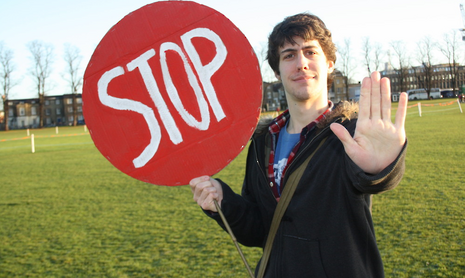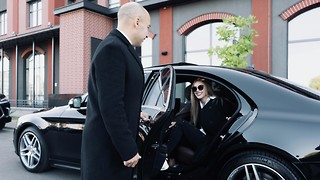Jailbreak: Raising without giving?
Katerina Pascoulis and Alexander Marshall debate the ethics of charity fundraising. But which one do you think is right?
We're liveblogging this year's Jailbreak, check it out on Varsity Live here!
On 25th January 300 students will be freezing (in an array of impractical costumes) on Parkers Piece ready for the start of Jailbreak 2013. For those few of you who haven’t heard of the event before – the aim is to get as far from Cambridge as possible within 36 hours without using any of your own resources, such as money, your car or a conveniently located family jet.
Whilst this sounds to most like a fun weekend raising money for charity, Jailbreak has also attracted substantial criticism from the more cynical among the student body. Firstly, the students competing are accused of taking part predominantly for a mid-term jaunt abroad, using charity as an excuse to reschedule a supervision. Whilst the opportunity to go on a spontaneous adventure obviously does motivate a lot of the students taking part, it’s this very attitude that makes the event so successful. People are interested to hear about what you’re doing and if this enthusiasm comes across on the day they’re more willing to help you out or donate than they would to a person that’s been standing in the cold miserably shaking a collecting tin.
Secondly, and perhaps more serious is the criticism that Jailbreak-ers might spend as much, or even more, money on travel than they eventually gain in sponsorship. Despite a lack of figures to disprove this claim, what is clear is that the nature of charity fundraising has changed. The word ‘charity’ is now no longer enough of a draw. The unrelenting flood of adverts, people with collecting tins on busy roads and obscure Facebook friends asking you to fund their trip to build an Ikea in the developing world create an overflow of information and mean people have become jaded with the whole idea of charity. As a result pure no-costs fund-raising often fail to make a fraction of the money these other events manage to raise.
A possible solution to the problems of Jailbreak is to attempt to spend no money on travel during the weekend, so all funds raised go to charity. Whilst this is the obvious solution it is becoming increasingly impractical and in 2010 I was blocked at every turn by red tape whilst trying to do just that. ‘We’d love to help but unfortunately…new policy…good luck though!’ we were told before being escorted away. The money free approach may have been plausible 10 years ago but nowadays we you’re laughed at by airline attendants when you ask for free seats – even for charity. Old fashioned hitch-hiking is also increasingly dying out, with less people prepared to either ask for, or offer, lifts on the roads.
Jailbreak raised over £54,000 for RAG last year for a number of deserving causes, a third of their overall total for the entire year deriving from this single weekend. The over-exposure to charity appeals and lack of money-free travel opportunities means that without the raising-money-for-travel approach, this sponsorship just could not be achieved, and for that reason alone Jailbreak is no bad thing.
Katerina Pascoulis

As sponsorship raising began for this year’s Jailbreak I encountered a remarkable degree of cynicism, especially amongst second and third year students, who had become increasingly sceptical about the motives and methods of Jailbreak.
For them, the adventure of Jailbreak has been diluted. My sister took part eight years ago when the majority of people hitch-hiked and begged tickets. Admittedly, her great escape ended just outside of Calais: not exactly an exotic location. Nonetheless she was happy to have made it out of the country at all; back then smaller gains were a greater achievement and the experience felt less predictable.
While I recognise that over the years it’s become harder to nab those free tickets now companies have cottoned on, for me this isn’t the problem. More worrying is the formulaic monetary-driven routine forced on most Jailbreakers. The reality of desperately rushing to London in order to beg lawyers and bankers for enough cash to purchase a plane ticket feels a little soulless. Take last year’s winners. They managed to get to Singapore thanks to the very generous donation of one man in a wealthy part of London. This quite simply isn’t an adventure; it’s a last minute, free vacation from study.
Facing facts, most people take part in Jailbreak fundamentally because they want to. This is entirely understandable; Jailbreak sounds like an exciting and elaborate middle finger to the ‘Cambridge bubble’. However, portraying Jailbreak as a charity endeavour raises some problems. Aren’t prospective Jailbreakers merely asking their friends and family to make a charity donation at a specific, convenient time in order to allow them to take part in the competition? Surely this is similar to someone doing a charity sky dive; the person most likely wants to jump out of that plane but uses charity for funding and legitimacy.
With Jailbreak, there is also the dubious question of how much money is spent travelling against how much the charity receives. Of course the defence is that, all in all, the event makes a lot of money for charities, but a huge amount is spent on indulging on a weekend away. This isn’t just true for outward bound Jailbreakers. Once there students are often faced with the trouble of getting home, resulting in several hundred pounds of their own money being spent on return tickets. It’s yet another indicator that charity is just an afterthought.
Perhaps I’m becoming old and cynical. After all, Jailbreak does raise funds for deserving charities, and these donations almost certainly wouldn’t have been made without the badgering of our Jailbreaking friends. It doesn’t hurt anyone either; it’s entertaining and raises money for worthy causes. Even so, that nagging voice in my head that says it’s just an excuse for affluent students to legitimately bunk off work for a weekend and have someone pay for them to fly somewhere, all under the banner of charity.
Alexander Marshall
 News / Uni offers students £55k in payouts31 October 2025
News / Uni offers students £55k in payouts31 October 2025 News / Uni error forces deeper spending cuts31 October 2025
News / Uni error forces deeper spending cuts31 October 2025 News / Students allowed to use AI, says new uni guidance31 October 2025
News / Students allowed to use AI, says new uni guidance31 October 2025 News / Students launch women’s society excluding trans women31 October 2025
News / Students launch women’s society excluding trans women31 October 2025 News / College rowing captains narrowly vote to exclude trans women31 October 2025
News / College rowing captains narrowly vote to exclude trans women31 October 2025









